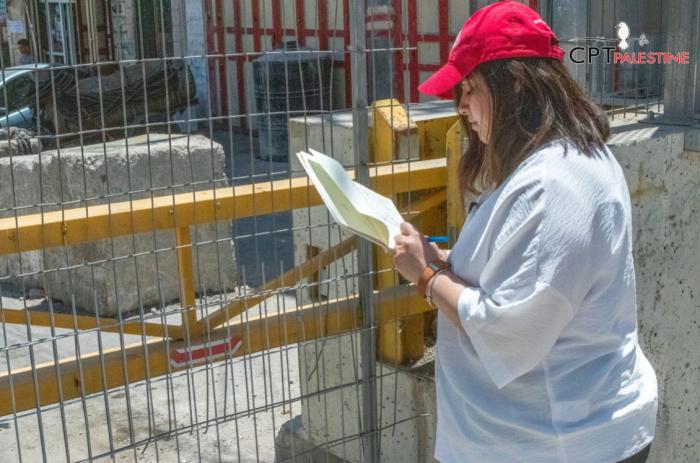It’s Monday, June 14
Every day before I sleep, I lay down and think about what has happened during the day. Today was very hard for me.
As usual as a CPTer, I woke up at six a.m. I went to the office to meet my colleagues, where we prepare ourselves for our day’s work. We check we have our IDs or see if we have a picture of it on our mobile phones. We then go to the checkpoints to monitor children going to school.
The first checkpoint we pass is the Mosque checkpoint. The Israeli border police stop us and ask us to show our IDs. I think it’s a way to tell us that they can control us, and they can do anything they want.
When this happens, I ask myself why do we need to give them our ID to pass through these checkpoints? In fact, why do these checkpoints exist? Why do we need to prove every time that we are not terrorists or just to pass through without any one of us being arrested or without any problem. “Everyone has the right to freedom of movement,” that is what the Universal Declaration of Human Rights says. But where is that right for Palestinians?
We then walk for about 100m to go through Abed checkpoint. Today they didn’t stop us but just looked at us. This behaviour now seems normal. But I remember the first day I had to. I was so stressed, I even avoided looking at the border police because I did not want them to shoot me or arrest me. I thought about all the bad things that might happen. I was so afraid. Honestly, even now, my heart beats faster when I walk through any checkpoint or see Israeli soldiers.
We walked a little further and passed through the third checkpoint, known as Court checkpoint, and the same thing happened. Then again at the fourth and fifth checkpoints, until we arrive at the checkpoint the children pass through to go to their schools.
Today, we went to monitor Al Salaymeh checkpoint. Like a normal working day we sat and started counting the children passing through. We monitor any ID checks, arrests, body checks, etc., and write notes. After about twenty-five minutes, we observed a young man named Saif call out to the Israeli soldiers to open the turnstile so he could get through with his bike. The soldiers told him to go through the electric barrier. After five minutes, they raised the barrier to allow Saif to pass. But while he was passing, the soldier dropped it on him, injuring his ear and ripping his shirt.
It is the first time I saw something like this happen while monitoring. I went, and I asked him, “Are you ok?” Despite being in pain and his ear bleeding, he replied, “I’m fine.”
At that moment, I felt helpless, and this made me angry and sad at the same time. The only thing I can do is ask Saif to go to the hospital to stop his bleeding.
Why can’t I stop this? Why can’t I go and ask the soldier why do you do something like this? Actually, there is no justification for what they did, and I honestly believe that there is no reason for all the things that the occupation does.
While walking back to the CPT office, I wondered why Saif told me he is fine while he is in pain. My point of view is that as Palestinians, “we have to be strong.” It’s hard to tell people that we don’t feel well. It makes us feel weak. Because of this and because we live under Israeli occupation, we need to prove to ourselves that we are stronger than them. Older people used to tell us that we have our dignity and that word has passed from generation to generation.
So this part of my journey with CPT Palestine, and now I will leave you with two questions, What do you think and feel reading this? Do you think what happened is acceptable? For me, it’s not.




